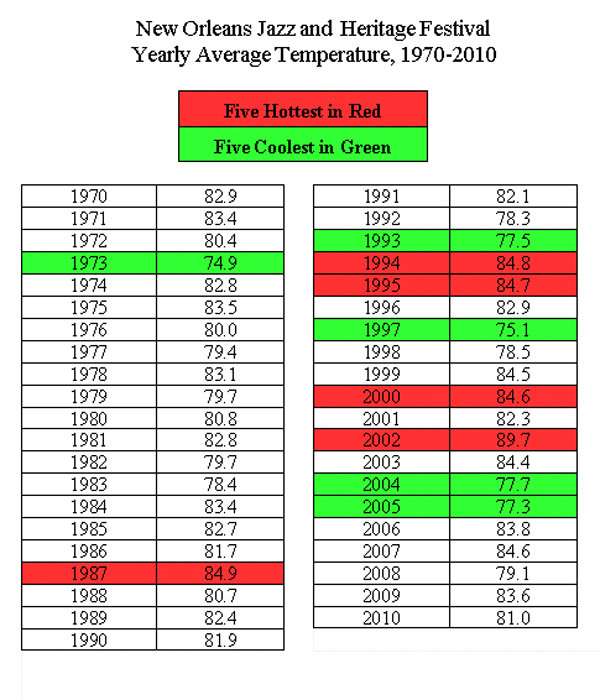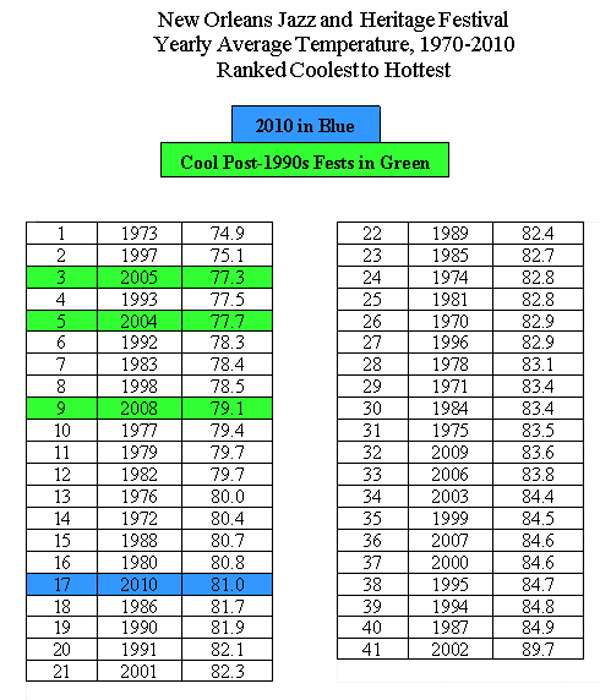Here in Louisiana we will be warmer in summer (think, maybe, 103 degrees at Jazz Fest) .... Houck, 19 Tul. Envtl. L. Rev 1, at 27.But the source he cites to:
Envtl. Prot. Agency, Climate Change and Louisiana 3 (1997) available at http:// yosemite.epa.gov/OAR/globalwarming.nsf/UniqueKeyLookup/SHSU5BURCA/$File/la_ impct.pdfmerely says:
[It] is projected that by 2100, temperatures in Louisiana could increase about 3̊ F (with a range of 1-5̊ F) in spring and summer, slightly less in winter, and slightly more in fall. Envtl. Prot. Agency, Climate Change and Louisiana 2 (1997).(Yes, I found that on page 2 of this report; I didn't see any discussion of temperatures on page 3 like Prof. Houck cited. And the EPA report is no longer at the URL he provided in his article - a perfect example of link rot in law reviews - so I put it on Google Docs.)
Last year I finally got around to researching the average temperatures of all Jazzfests during the past 40 years and, long story short, its never been so hot at Jazzfest that a 3 degree increase (or even, at the high end of the EPA range, a 5 degree increase), would get us anywhere close to 103 degrees: the hottest Jazzfest ever was 2002, with a average daily high temperature of 89.7 degrees (and, yes, I know, I know, you can argue that Prof. Houck was just being all folksy and informal, essentially saying “gosh-its-gonna-be-a-hunnert-an-three-at-Jazzfest-if-we-don’t-DO-something!!!”).
But this WAS written in a leading environmental law journal published by one of the country’s top fifty law schools and if this is the level of argument that counts as serious scholarship, then law professors everywhere should give up all pretense at objectivity and logic and just preach what they think the law SHOULD be. (Most of them are already doing this, but if they didn’t bother with “supporting” sources, citations, and footnotes, all these beleaguered law review students could be saved a lot of needless effort doing their sub-and-cites.)
So here’s my update of the charts I made last year, now including this year’s average temperatures at Jazzfest. (For the methodology, read last year’s post.) This year’s Jazzfest was in the cooler half of all 41 Jazzfests, with an average daily high of 81.0 degrees. Here’s the charts:
First, the average temperatures of all 41 Jazzfests, in chronological order:

Yes, we had a very mild week and a half of Jazzfest, a full 2.6 degrees cooler than last year. And, yes, the climate change alarmists will say that normal variations may results in an unusually cool week and a half in a certain location despite “global warming”, but you’d be hard pressed to find one say that, by the same reasoning, normal variations may also result in an unusually hot week and a half (like Jazzfest was in 2002). The bottom line is we’re 23 degrees away from Prof. Houck’s apocalyptic - and totally unsupported by the source he cited in the relevant footnote in his article - prediction, and in the four years since he wrote this Jazzfest temperatures have been trending down.
Here are the 41 Jazzfests ranked hottest to coolest:

And ranked coolest to hottest:

Conclusions, like last year, to be drawn are that, yes, the planet got measurably warmer in the past century but temperatures have reached a plateau and stayed at about the same point for the past decade, despite predictions that global temperatures should keep increasing steadily.
Even some of the anthropogenic global warming alarmists will admit this, though they can't all keep their stories straight. Last month, in his New York Times Magazine cover story, Building a Green Economy, Paul Krugman wrote:
Second, climate models predicted this well in advance, even getting the magnitude of the temperature rise roughly right. While it’s relatively easy to cook up an analysis that matches known data, it is much harder to create a model that accurately forecasts the future. So the fact that climate modelers more than 20 years ago successfully predicted the subsequent global warming gives them enormous credibility. (Id. (Emphasis Added))Except that, according to a story on NPR - which you would expect to be hand in hand with Krugman and the New York Times on this:
Global warming skeptics have made quite a fuss over the fact the planet hasn’t actually warmed that much over the past decade, and there lies a genuine scientific mystery. The planet has been receiving more solar energy than it's been releasing back into space. Heat ought to be building up somewhere but scientists can't find it. Richard Harris, Examining A Climate Conundrum, All Things Considered, April 27, 2010.So which is it? Is the planet warming like the scientists predicted or are they baffled by how global warming has stalled in the past ten year? The NPR story at least references a few scientists and articles, which Krugman does not, and it concludes with a discussion of one scientist who has what is apparently the only working theory on this, and that he is finding
[E]vidence of warming deep in the ocean. He's still analyzing that data, so he can't yet say whether it will explain the entire paradox. But he says it will explain at least a chunk of it, and thats how science proceeds: mysteries, explanations, more questions and gradually deeper understanding. (Id.)So the data is still fresh, but the scientist is sure it will explain away the “apparent” lack of warming in the past decade. Thus NPR placates the alarmists with a pat re-assurance that this new research will explain the lack of predicted warming in the past decade and that - oh, relief - yes, mankind IS causing a catastrophic increase in global temperatures, but its just not evident right now. So please continues buying carbon credits from Al Gore.




No comments:
Post a Comment